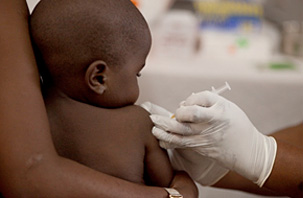- Added 3 Apr 2018
Kilimanjaro Clinical Research Institute (KCRI)
Experience
KCRI IS AN ACADEMIC CENTRE FOR EVIDENCE BASED HEALTH INTERVENTIONS
For nine years It Initiates and conducts medical research to develop evidences for interventions,and provides research training and necessary research logistics to collaborators and partners
Research interests
PanACEA, EACCR, TWENDE and REDMAL
Disease areas
- HIV
- Malaria
- Maternal Health
- Newborn Health
- Respiratory Diseases
- TB
Clinical Trial Unit We are in the unique possession of a clinical trial unit. The clinical trial unit accommodates necessary sections required for Good Clinical Practice (GCP) compliant clinical trials; rooms for registration, examination, pharmacy, drug administration, observation and management of adverse events, laboratory, and kitchen. The trial unit has two wards with twelve beds for continuous observation e.g. in continuous pharmacokinetic studies. Biotechnology Laboratory The biotechnology laboratory is a high technology laboratory. Over a period, the laboratory has been equipped and staffed by several projects. BL and other research laboratories at KCMC form the KCRI department of Biotechnology and Research laboratories. The range of laboratory equipments available include: equipments for haematology (e.g. Cell Dyn, Beckman Coulter), for biochemistry (Cobas Integra 400plus, Refletron machine), for immunology (ELISA Reader – Bio-Rad, Biotex, BD Facs caliber, Flow Cytometry, ELISPOT Reader, Olympus Inverted microscope, Bio-plex), for bacteriology (Bactec - BACT/ALERT3D, MGIT 960, Fluorescent microscope, p3 safety cabinet, Gen probe loader), and for molecular (HIV RNA sample processor, HIV1 DNA PCR, QIA cube sample processor, Corbett Robotics, Thermocyclers). Procedures done include Serological tests, HIV testing (ELISA, Rapid tests and Western blot), HIV-1 RNA Viral load – using Abbott M2000RT, HIV1 DNA testing, real time PCR for TB, Peripheral Blood Mononuclear Cells (PBMC) processing, Phenotypic analysis for lymphocytes, Biochemistry, Microbiology, cultures for serial colon counting, Bacterial and Mycobacterial identification and drug susceptibility testing. Sample storage facilities include archive unit with freezers, deep freezers up to -800◦ C, dry preservation, and liquid nitrogen facility. BL also operates liquid nitrogen and oxygen production plants through the KCMC-GSF oxygen plant. . Linked to the BL is an InsectoryInsectary unit and an animal house, which at present support research operations of the Parasitology and Entomology division. Back-up and emergency facilities The field sites are strategically located in North-Eastern Tanzania: they are along tarmac roads, cover the stretch of land from the Indian Ocean all the way to Ngorongoro Conservation Area. This area has varying geophysical features from highlands, mountainous outcrops and lowlands to the endless plains of the Serengeti National Park. Also, the area has a diverse ethnic population including Nilotics, Bantus, Asians and the Hadzabe tribe. Human occupation is diverse from subsistence farmers, fishermen, and pastoralists to miners at the Tanzanite mining sites. These diversities have contributed to different characteristics of the same diseases. This is important in understanding diseases and their natural course. Such diversity of diseases, occupations, and geographical characteristics makes this location an ideal setting for research that can result into generic findings. KCRI has been able to identify and prepare sites for studies. Sites have been established for research in malaria (e.g. lower Moshi, Rift Valley area, Handeni), tuberculosis (Kibong’oto Hospital, Mererani, Same, Chekereni) and for HIV (Majengo Clinic, Mererani, Same, Chekereni). The site has a back up Generator 100KVA and 300KVA which support incase of any emergency electricity cut off, 100KVA stabilizer and a 100KVA back up UPS. Other relevant infrastructures Information and communication technology The ICT department of KCRI takes care of all ICT equipment, hardware, software and internetInternet but also the power supply. Having 2 servers in different location (main building and laboratory) provide security for back up stored data. . Bio-repository The biorepository unit of KCRI contains a biobank, sample storage, warehouse and cold room. Which are supported by back up generator
Other information
KCRI is a fully operational research institute based in Northern Tanzania with all facilities needed to conduct medical research including a biotechnology laboratory, a clinical trial unit and field sites on a local and international level. Each research team can make use of those facilities. In addition, supporting facilities such as research administration, data management and IT are available. KCRI comprises two buildings, the main building and the biotechnology laboratory building.
The main buildings are based on the KCMC complex and were constructed with funds from NWO-WOTRO (Dutch organization for Scientific Research, department of Science for Global Development) through the APRIORI Program, EDCTP (European & Developing Countries Clinical Trials Partnership) through the EACCR (East African Consortium for Clinical Research) and VITA Projects and from BMGF through KCMC-LSHTM (London School of Hygiene and Tropical Medicine) collaboration. It accommodates the clinical trial unit, administration and finance offices, IT offices, a video-teleconferencing facility, data management offices, data archiving rooms, electronic library and lecture rooms and the biotechnology laboratory. KCRI Through EDCTP funded capacity building had established a clinical trial unit at Kibong’oto hospital which is the main recruitment site for TB clinical trials for the site.
Documents
Contact this site
To: Dr. Alphonce Liyoyo, Research site at Kilimanjaro Clinical Research Institute (KCRI)
Please Login to contact a site.